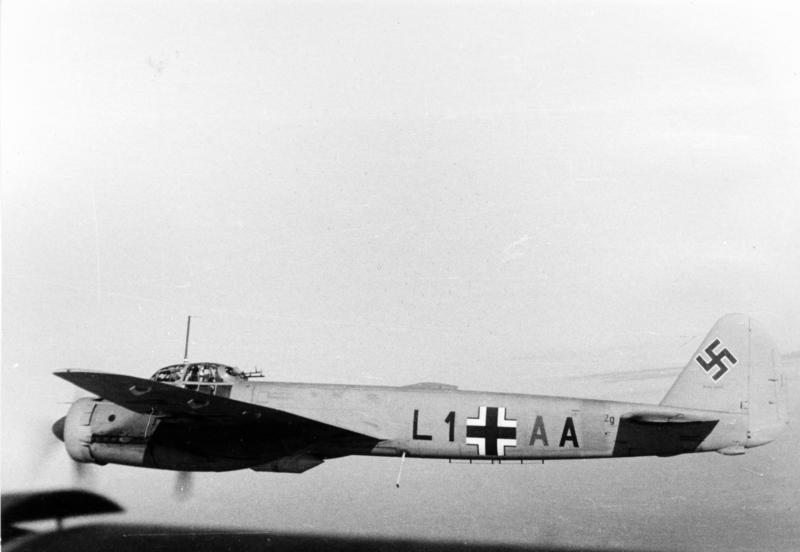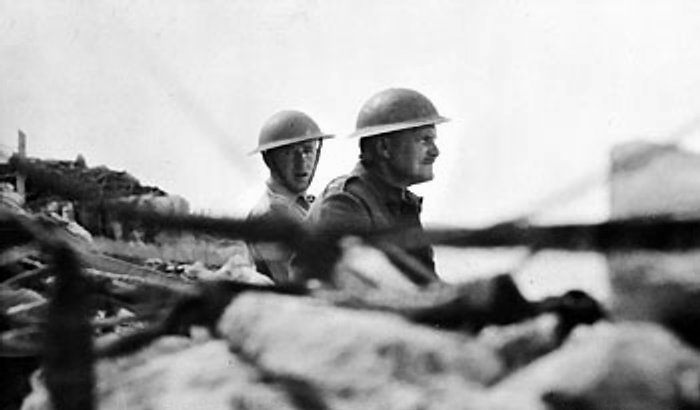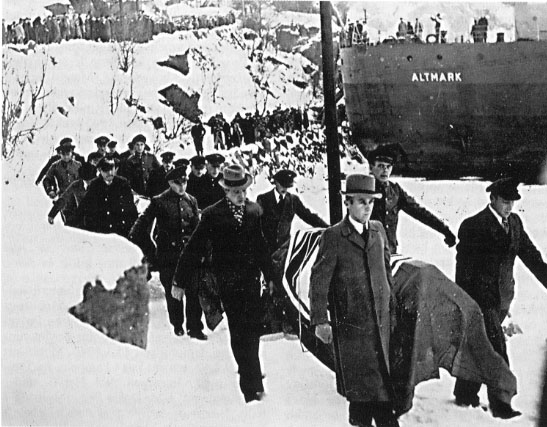|
Hermann Hogeback
Hermann Hogeback (25 August 1914 – 15 February 2004) was a German bomber pilot during the Nazi era. He flew more than 100 operational sorties during the Spanish Civil War and 500 during World War II and was a recipient of the Knight's Cross of the Iron Cross with Oak Leaves and Swords of Nazi Germany. Hogeback's last service position was commander of the 6th Bomber Wing. Born in 1914, Hogeback joined the military service of the Wehrmacht in 1934. He transferred to the Luftwaffe in 1935; he volunteered for service with the Condor Legion in the Spanish Civil War. During World War II he fought in the Invasion of Poland, Battle of France, Operation Weserübung, the German invasion of Norway, Battle of Britain, Battle of Crete, siege of Malta, Mediterranean theatre of operations, over the Eastern Front and in Defense of the Reich. Childhood, early career and Spanish Civil War Hogeback, the son of a tax inspector, was born on 25 August 1914 in Idar-Oberstein at the time in th ... [...More Info...] [...Related Items...] OR: [Wikipedia] [Google] [Baidu] |
Der Adler
''Der Adler'' (literally "The Eagle") was a biweekly Nazi propaganda magazine published by the Scherl Verlag, founded by August Scherl, with the support of the Luftwaffe High Command. From 1939 to 1944, 146 magazine issues were published in total. Each magazine had 24 to 36 pages, but the amount of pages was reduced to 12 when the fall of Nazi Germany was near. See also * ''Signal'' - Army equivalent * '' Kriegsmarine'' - German Navy equivalent * ''Die Wehrmacht ''Die Wehrmacht'' was a German military magazine, which was published from 1936 to 1944 to serve German Reich propaganda purposes. It promoted the newly formed Wehrmacht, official editor was the new Oberkommando der Wehrmacht from February 1938 on ...'' - Covering all the armed services References * Sidney L. Mayer, Masama Tokoi (1978): ''Der Adler. Eine Auswahl aus der Illustrierten der Luftwaffe 1939–1944.'' Stuttgart, Germany: Motorbuch-Verlag. . Further reading * {{DEFAULTSORT:Adler 1939 establishments in Ger ... [...More Info...] [...Related Items...] OR: [Wikipedia] [Google] [Baidu] |
Nazi Germany
Nazi Germany (lit. "National Socialist State"), ' (lit. "Nazi State") for short; also ' (lit. "National Socialist Germany") (officially known as the German Reich from 1933 until 1943, and the Greater German Reich from 1943 to 1945) was the German state between 1933 and 1945, when Adolf Hitler and the Nazi Party controlled the country, transforming it into a dictatorship. Under Hitler's rule, Germany quickly became a totalitarian state where nearly all aspects of life were controlled by the government. The Third Reich, meaning "Third Realm" or "Third Empire", alluded to the Nazi claim that Nazi Germany was the successor to the earlier Holy Roman Empire (800–1806) and German Empire (1871–1918). The Third Reich, which Hitler and the Nazis referred to as the Thousand-Year Reich, ended in May 1945 after just 12 years when the Allies defeated Germany, ending World War II in Europe. On 30 January 1933, Hitler was appointed chancellor of Germany, the head of gove ... [...More Info...] [...Related Items...] OR: [Wikipedia] [Google] [Baidu] |
Officer Cadet
Officer Cadet is a rank held by military cadets during their training to become commissioned officers. In the United Kingdom, the rank is also used by members of University Royal Naval Units, University Officer Training Corps and University Air Squadron; however, these are not trainee officers with many not choosing a career in the armed forces. The term officer trainee is used interchangeably in some countries. Australia The Australian Defence Force follows the same usage as the British military system, using the rank of officer cadet (for the Australian Army (OCDT) and the Royal Australian Air Force (OFFCDT)), for personnel undergoing initial officer training. Unlike midshipmen in the Royal Australian Navy who hold a commission, officer cadets in the Australian Army and Royal Australian Air Force do not yet hold a permanent commission, and are not saluted or referred to as "sir" or "ma'am". They do however hold probationary commissions. Officer cadets in the Australian ... [...More Info...] [...Related Items...] OR: [Wikipedia] [Google] [Baidu] |
Abitur
''Abitur'' (), often shortened colloquially to ''Abi'', is a qualification granted at the end of secondary education in Germany. It is conferred on students who pass their final exams at the end of ISCED 3, usually after twelve or thirteen years of schooling (see also, for Germany, ''Abitur'' after twelve years). In German, the term has roots in the archaic word , which in turn was derived from the Latin (future active participle of , thus "someone who is going to leave"). As a matriculation examination, ''Abitur'' can be compared to A levels, the '' Matura'' or the International Baccalaureate Diploma, which are all ranked as level 4 in the European Qualifications Framework. In Germany Overview The ("certificate of general qualification for university entrance"), often referred to as ("''Abitur'' certificate"), issued after candidates have passed their final exams and have had appropriate grades in both the last and second last school year, is the document which con ... [...More Info...] [...Related Items...] OR: [Wikipedia] [Google] [Baidu] |
Münster
Münster (; nds, Mönster) is an independent city (''Kreisfreie Stadt'') in North Rhine-Westphalia, Germany. It is in the northern part of the state and is considered to be the cultural centre of the Westphalia region. It is also a state district capital. Münster was the location of the Anabaptist rebellion during the Protestant Reformation and the site of the signing of the Treaty of Westphalia ending the Thirty Years' War in 1648. Today it is known as the bicycle capital of Germany. Münster gained the status of a ''Großstadt'' (major city) with more than 100,000 inhabitants in 1915. , there are 300,000 people living in the city, with about 61,500 students, only some of whom are recorded in the official population statistics as having their primary residence in Münster. Münster is a part of the international Euregio region with more than 1,000,000 inhabitants ( Enschede, Hengelo, Gronau, Osnabrück). History Early history In 793, Charlemagne sent out Ludger as ... [...More Info...] [...Related Items...] OR: [Wikipedia] [Google] [Baidu] |
German Empire
The German Empire (),Herbert Tuttle wrote in September 1881 that the term "Reich" does not literally connote an empire as has been commonly assumed by English-speaking people. The term literally denotes an empire – particularly a hereditary empire led by an emperor, although has been used in German to denote the Roman Empire because it had a weak hereditary tradition. In the case of the German Empire, the official name was , which is properly translated as "German Empire" because the official position of head of state in the constitution of the German Empire was officially a "presidency" of a confederation of German states led by the King of Prussia who would assume "the title of German Emperor" as referring to the German people, but was not emperor of Germany as in an emperor of a state. –The German Empire" ''Harper's New Monthly Magazine''. vol. 63, issue 376, pp. 591–603; here p. 593. also referred to as Imperial Germany, the Second Reich, as well as simply Germany, ... [...More Info...] [...Related Items...] OR: [Wikipedia] [Google] [Baidu] |
Grand Duchy Of Oldenburg
The Grand Duchy of Oldenburg (, also known as Holstein-Oldenburg) was a grand duchy within the German Confederation, North German Confederation and German Empire that consisted of three widely separated territories: Oldenburg, Eutin and Birkenfeld. It ranked tenth among the German states and had one vote in the Bundesrat and three members in the Reichstag. Its ruling family, the House of Oldenburg, also came to rule in Denmark, Norway, Sweden, Greece and Russia. History The Grand Duchy of Oldenburg came into existence in 1815 combining the territory of the old Duchy of Oldenburg with the Principality of Birkenfeld. Whilst Oldenburg was elevated to a Grand Duchy at the Congress of Vienna, the first two Grand Dukes continued to style themselves as merely Dukes and it wasn't until 1829 that the newly acceded Augustus used the title of Grand Duke. Although paternalist, the early Grand Dukes did not grant a constitution until events overtook them in 1848. The European Re ... [...More Info...] [...Related Items...] OR: [Wikipedia] [Google] [Baidu] |
Tax Inspector
A tax collector (also called a taxman) is a person who collects unpaid taxes from other people or corporations. The term could also be applied to those who audit tax returns. Tax collectors are often portrayed as being evil, and in the modern world share a similar stereotype to that of lawyers. History Tax collectors in the Bible Tax collectors, also known as publicans, are mentioned many times in the Bible (mainly in the New Testament). They were reviled by the Jews of Jesus' day because of their perceived greed and collaboration with the Roman occupiers. Tax collectors amassed personal wealth by demanding tax payments in excess of what Rome levied and keeping the difference. They worked for tax farmers. In the Gospel of Luke, Jesus sympathizes with the tax collector Zacchaeus, causing outrage from the crowds that Jesus would rather be the guest of a sinner than of a more respectable or " righteous" person. Matthew the Apostle in the New Testament was a tax collector. Other ... [...More Info...] [...Related Items...] OR: [Wikipedia] [Google] [Baidu] |
Siege Of Malta (World War II)
The siege of Malta in World War II was a military campaign in the Mediterranean Theatre. From June 1940 to November 1942, the fight for the control of the strategically important island of the British Crown Colony of Malta pitted the air and naval forces of Fascist Italy and Nazi Germany against the Royal Air Force (RAF) and the Royal Navy. The opening of a new front in North Africa in June 1940 increased Malta's already considerable value. British air and sea forces based on the island could attack Axis ships transporting vital supplies and reinforcements from Europe; Churchill called the island an " unsinkable aircraft carrier". General Erwin Rommel, de facto field command of Axis forces in North Africa, recognised its importance quickly. In May 1941, he warned that "Without Malta the Axis will end by losing control of North Africa". The Axis resolved to bomb or starve Malta into submission, to soften it up for invasion, by attacking its ports, towns, cities, and Al ... [...More Info...] [...Related Items...] OR: [Wikipedia] [Google] [Baidu] |
Battle Of Crete
The Battle of Crete (german: Luftlandeschlacht um Kreta, el, Μάχη της Κρήτης), codenamed Operation Mercury (german: Unternehmen Merkur), was a major Axis airborne and amphibious operation during World War II to capture the island of Crete. It began on the morning of 20 May 1941, with a multiple German airborne landings on Crete. Greek and other Allied forces, along with Cretan civilians, defended the island. After only one day of fighting, the Germans had suffered heavy casualties and the Allied troops were confident that they would defeat the invasion. The next day, through communication failures, Allied tactical hesitation, and German offensive operations, Maleme Airfield in western Crete fell, enabling the Germans to land reinforcements and overwhelm the defensive positions on the north of the island. Allied forces withdrew to the south coast. More than half were evacuated by the British Royal Navy and the remainder surrendered or joined the Cretan resistance. ... [...More Info...] [...Related Items...] OR: [Wikipedia] [Google] [Baidu] |
Operation Weserübung
Operation Weserübung (german: Unternehmen Weserübung , , 9 April – 10 June 1940) was Germany's assault on Denmark and Norway during the Second World War and the opening operation of the Norwegian Campaign. In the early morning of 9 April 1940 (''Wesertag'', "Weser Day"), Germany occupied Denmark and invaded Norway, ostensibly as a preventive manoeuvre against a planned, and openly discussed, French-British occupation of Norway known as Plan R 4 (actually developed as a response to any German aggression against Norway). After the occupation of Denmark (the Danish military was ordered to stand down as Denmark did not declare war with Germany), envoys of the Germans informed the governments of Denmark and Norway that the ''Wehrmacht'' had come to protect the countries' neutrality against Franco-British aggression. Significant differences in geography, location and climate between the two nations made the actual military operations very dissimilar. The invasion fleet's n ... [...More Info...] [...Related Items...] OR: [Wikipedia] [Google] [Baidu] |
Invasion Of Poland
The invasion of Poland (1 September – 6 October 1939) was a joint attack on the Republic of Poland by Nazi Germany and the Soviet Union which marked the beginning of World War II. The German invasion began on 1 September 1939, one week after the signing of the Molotov–Ribbentrop Pact between Germany and the Soviet Union, and one day after the Supreme Soviet of the Soviet Union had approved the pact. The Soviets invaded Poland on 17 September. The campaign ended on 6 October with Germany and the Soviet Union dividing and annexing the whole of Poland under the terms of the German–Soviet Frontier Treaty. The invasion is also known in Poland as the September campaign ( pl, kampania wrześniowa) or 1939 defensive war ( pl, wojna obronna 1939 roku, links=no) and known in Germany as the Poland campaign (german: Überfall auf Polen, Polenfeldzug). German forces invaded Poland from the north, south, and west the morning after the Gleiwitz incident. Slovak military forces ad ... [...More Info...] [...Related Items...] OR: [Wikipedia] [Google] [Baidu] |






